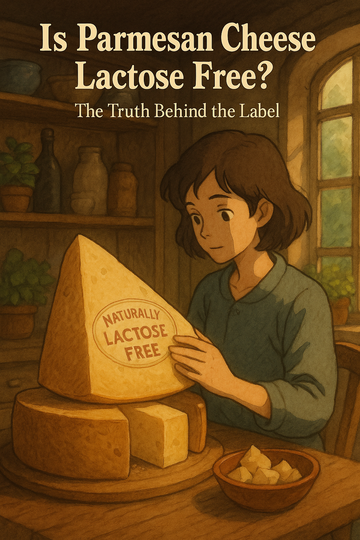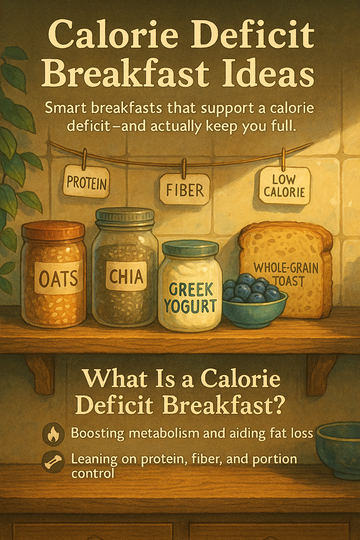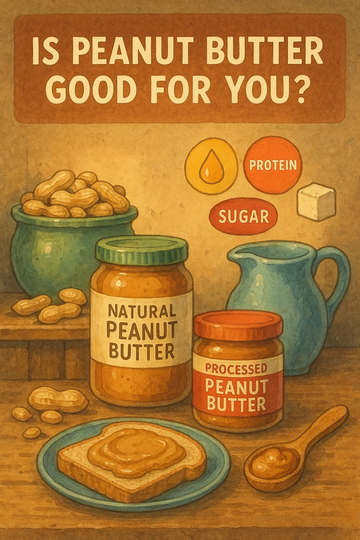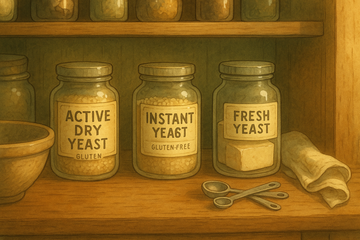Is Parmesan Cheese Lactose Free? The Truth Behind the Label
Step into a rustic Italian village, where golden wheels of Parmesan age quietly in stone-walled cellars. The scent of aged cheese mingles with warm mountain air as curious fireflies dance near a wooden table… On it lies a simple question that has puzzled many:
“Is Parmesan Cheese Lactose Free?”
If you’re lactose-intolerant but crave that nutty, savory taste of Parmesan, here’s some comforting news: Yes, Parmesan is virtually lactose-free—but there’s a story behind every slice.
🧀 What Is Parmesan, Really?
Known as Parmigiano Reggiano in its most traditional form, this cheese is born from:
-
Fresh cow’s milk
-
A touch of natural rennet
-
A whisper of sea salt
-
And… time. Lots of time.
Aged from 12 to 36 months, each wheel matures like a wise elder, developing a brittle texture, rich umami, and almost no sugar.
Imagine monks in a monastery brushing dust from cheese wheels under soft candlelight—it’s that magical.
🔬 Does Parmesan Contain Lactose?
Technically, yes—but it’s practically undetectable.
-
Most Parmesan has < 0.1g of lactose per 100g
-
In many cases, tests find zero measurable lactose
That’s thanks to age-old cheese-making alchemy that works like this…
🧙 Why Parmesan Is Kind to Your Belly
🌱 Aging Breaks Down the Sugar
During fermentation, lactic acid bacteria feast on lactose, transforming it into lactic acid—leaving your tummy in peace.
💧 Whey Removal Does the Trick
Most lactose leaves with the liquid whey, long before aging begins.
Hard = Less Residual Sugar
The drier the cheese, the less room for lactose to hide. Parmesan’s hard texture is a belly’s best friend.
Visualize forest spirits chiseling away at lactose molecules under moonlight—it’s basically that cute and clever.
🛒 How to Choose a Safe Parmesan
Not all "Parmesan" is pure. Here’s how to choose wisely:
-
Look for “Parmigiano Reggiano DOP” — aged at least 12 months
-
Read the label: If it says “Naturally Lactose Free”, you're safe
-
Avoid grated or processed versions — they might contain fillers
Stick to the solid wedges, carved with love and aged in wooden caves.
🧀 Other Cheeses That Are Gentle on the Gut
Don’t stop at Parmesan! Other low-lactose cheeses include:
-
Aged Cheddar
-
Gruyère
-
Aged Gouda
-
Swiss
-
Camembert
-
Blue Cheese
All aged, all mellow, and all likely safe for lactose-sensitive folks.
🧑⚕️ Should People with IBS or Celiac Try It?
In most cases, yes.
Parmesan is:
-
Naturally gluten-free
-
Low in lactose
-
Packed with protein and calcium
But start small. A spoonful atop warm pasta. Let your body tell you its tale.
✨ Final Thoughts
So, is Parmesan cheese lactose free?
Magically, yes.
Through centuries of craft, careful aging, and nature’s own chemistry, Parmesan becomes a cheese that most lactose-intolerant folks can enjoy safely.
So go ahead—grate it over roasted veggies, melt it into risotto, or savor it solo under the stars.
And remember: in the storybook of cheese, Parmesan is the wise wizard who makes digestion just a little easier.





